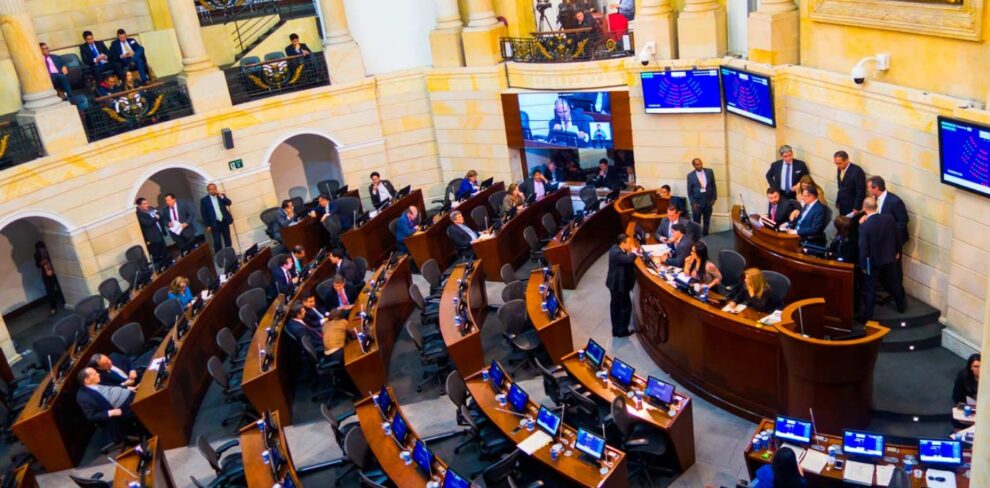The Colombian Senate introduced on Wednesday a majority-endorsed motion in support of Morocco’s territorial integrity and its sovereignty over Western Sahara.
The motion reflects the legislative body’s dissatisfaction with President Gustavo Petro’s August 2022 decision to re-establish diplomatic ties with the Algeria-backed Polisario Front, the separatist militia claiming independence in southern Morocco.
The motion stresses Colombia’s rejection of the current government’s “ill-advised decision” to establish relations with Polisario’s self-styled Sahrawi Arab Democratic Republic (SADR).
“As Senators and legitimate representatives of the Colombian people, we deeply reject the ill-advised decision by the current government, which in no way represents the position of Colombians towards Morocco,” the motion states.
The text of the motion was approved by an overwhelming majority of 65 senators out of 105 in the upper house of the Colombian Congress, including politicians from the Latin American country’s main political parties.
It was also supported by Ivan Leonidas Name of the Green Alliance Political party, who is President of the Congress and the Colombian Senate, and Lidio Garcia Turbay of the Liberal Party, the President of the Senate’s Foreign Relations Committee.
The motion comes a year after the October 2022 motion that saw 62 out of 108 senators in Colombia’s senate vote against their president’s decision to restore diplomatic ties with Polisario.
“We regret that this government has once again turned a deaf ear not only to our motion of October 19, 2022, signed by 63 Senators representing nine political parties but also to our numerous calls for respect for the sovereignty and territorial integrity of the Kingdom of Morocco,” said the motion.
It then cited Morocco and Colombia’s nearly half-century friendship and recalled Morocco’s role as an invaluable and highly strategic Colombian ally in Africa and the Arab world, in light of its leadership and recognition on the regional and global level.
In particular, the motion denounced the Colombian president’s decision to reestablish ties with the Polisario Front, saying that this was a clear violation of the Vienna Convention of 1961 governing diplomatic relations.
The convention clearly states that diplomatic relations can only be established between recognized sovereign states, the motion recalled, pointing out that the Polisario Front lacks the minimal attributes of a state, as it is neither recognized by the United Nations nor by a majority of states.
Documents presented with the motion explain that President Petro’s decision to re-establish diplomatic ties with the Polisario Front violated the “cardinal principles” of Colombian diplomacy, including respect for international legality, non-interference in the internal affairs of countries, and respect for their territorial sovereignty.
Meanwhile, the motion’s signatories vehemently distanced themselves from the Colombian government’s current position on the Sahara dispute, stressing that it stands in stark contrast to the ongoing UN-led political process to find a permanent, lasting resolution to the territorial dispute.
The signatories also stressed the need for Colombia to nurture a strong and strategic partnership with Morocco, adding that they “deplore the deep crisis” caused by President Petro’s ideological embrace of Polisario’s separatism in southern Morocco.
They took issue with the suspension of Colombian-Moroccan cooperation in the president of crucial sectors for Colombia, such as agriculture, renewable energy, port traffic, railways, and tourism, accusing President Petro of preferring to be friends with a separatist and terrorism-linked group that cannot benefit his country.
The motion, which received the support of all of Colombia’s major parties excluding President Petro’s radical leftist party, was read during a plenary session of the Senate by Senator German Alcides Blanco Alvarez, the president of the Colombia-Morocco friendship group in the Senate and the president of the constitutional commission, the most important committee in the Colombian Congress. The motion’s text will be sent to President Gustavo Petro and his Minister of Foreign Relations, Alvaro Leyva.
The enthusiastic support of the upper house of the Colombian Congress for Morocco’s sovereignty over the Sahara is not an isolated case, as the Senate of the Latin American country has repeatedly distanced itself from President Preto’s embrace of the Polisario.
Most members of the Colombian political establishment have in recent years and months expressed their support for Morocco’s Autonomy Plan and its sovereignty over the Sahara.
In particular, they have pointed to the unprecedented depth of Morocco’s growing diplomatic outreach and stressed the strategic importance of maintaining cordial relations with the North African country.
With the Colombian and Peruvian political classes apparently deeply divided over whether to shun Polisario separatism or commit to their long-standing but apparently fragile friendship with Morocco, many expect the Moroccan diplomatic establishment to renew its apparent determination to win the support of former Polisario Front sympathizers.
Source: Morocco World News















